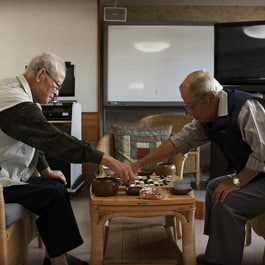Enhancing Food Safety for an Aging Population

AN Aging PopuLation
By 2050, one in four people will live in a country where more than 30 percent of people are above age 60, according to the United Nation’s World Population Ageing 2015 report1. As the world’s population increases in age, so too does demand for long-term care facilities that foster a healthy environment for seniors.
One of the strongest contributors to establishing a healthy environment in senior health care centers is ensuring the availability of safe food. On a population basis, infants and young children are more likely to become ill because of food related issues but adults 65 years or older are at a “higher risk for hospitalization and death from foodborne illness”, according to US Food Safety agencies2. Seniors “living in nursing homes are ten times more likely to die from bacterial gastroenteritis than the general population”.
The issue is especially pertinent for the South-East Asia region, which the World Health Organization reports as having some of the highest burden of foodborne diseases3. Globally, norovirus causes significant levels of illness in the developed world. The virus, which is commonly known as food poisoning or the “stomach flu”, often results in vomiting, diarrhea and extreme gastric discomfort. In 2016, Japan saw the highest levels of norovirus infections in a decade, according to Japan’s National Institute of Infectious Disease4.

A Family Connection
Established in 1923, Ecolab’s solutions have helped long-term care facilities achieve a high standard for food safety. The company’s integrated program approach leverages technology, service, auditing, training, information and actionable reporting to prevent and solve food safety and hygiene challenges for long-term care facilities.
For Daisuke Kubota, the district manager for Ecolab’s Institutional division in Japan, creating a healthy long-term care environment is something close to his heart. Kubota’s father is now in a nursing home after it became too difficult to provide care at home.
I now better understand the significance of Ecolab’s long-term care solutions. We provide solutions to meet unique needs of long-term care facilities from dishwashing, laundry, housekeeping to ensuring food safety in the kitchen.
DAISUKE KUBOTA, Ecolab District Manager

A Holistic Approach
Ecolab solutions include products to help improve employee hygiene practices and sanitize equipment used to process, prepare or serve food, as well as detergents and cleansers to sanitize a variety of surfaces. Examples of Ecolab solutions include:
- Nexa™ Hand Sanitizer System, which includes general use hand soaps, antibacterial hand soaps and hand sanitizers, sustainably packaged in refillable bottles to help reduce product waste by up to 90 percent.
- Our Aquanomic™ Laundry Program delivers clean, white, soft and fresh linens while reducing water and energy consumption by up to 40%. Our Smart Wash Process enables laundries to reduce wash steps, water usage and water temperature.
“With an estimated 80 percent of infections transmitted by hands, one of our key focuses is to improve hand hygiene,” said Dr. Ruth Petran, vice president of Food Safety and Public Health at Ecolab. “Across market sectors, Ecolab’s hand hygiene solutions help clean 34 billion hands per year—helping to prevent the spread of infection and foodborne illness. Ecolab also supports restaurant kitchens to stay clean so they can safely serve 45 billion meals annually.”


